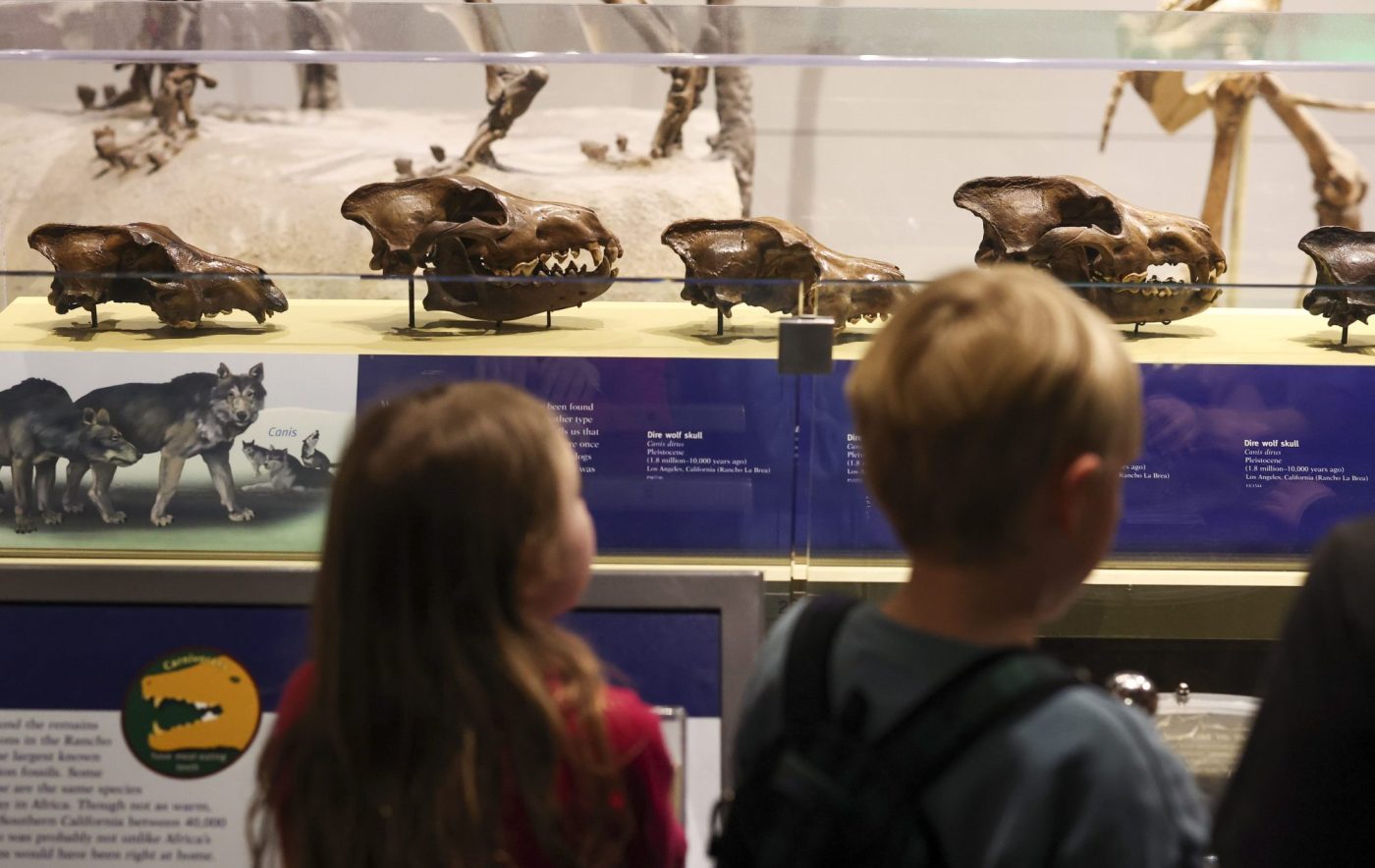As the Trump administration slashes funding for health, energy and climate research, there’s one science the administration is promoting: de-extinction.
Earlier this month, a biotechnology company announced it had genetically engineered three gray wolf pups to have white hair, more muscular jaws and a larger build — characteristics of the dire wolf, a species that hasn’t roamed the Earth for several millennia.
Now, the Trump administration is citing the case of the dire wolf as it moves to reduce federal protections under the Endangered Species Act of 1973. On Wednesday, the U.S. Fish and Wildlife Service and National Oceanic and Atmospheric Administration announced a proposed rule to rescind the definition of “harm” under the act — which for decades has included actions like harassing, pursuing, hunting or killing endangered wildlife and plants, as well as habitat destruction.
This undated photo provided by Colossal Biosciences shows a young wolf that was genetically engineered with similarities to the extinct dire wolf. (Colossal Biosciences via AP)
“The status quo is focused on regulation more than innovation. It’s time to fundamentally change how we think about species conservation,” said Interior Secretary Doug Burgum in an April 7 post on X, formerly Twitter. “The revival of the Dire Wolf heralds the advent of a thrilling new era of scientific wonder, showcasing how the concept of ‘de-extinction’ can serve as a bedrock for modern species conservation.”
But bioethicists and conservationists are expressing unease with the kind of scientific research being pioneered by Colossal Biosciences, a Dallas-based company on a mission to bring back extinct animals.
“Unfortunately, as clever as this science is … it’s can-do science and not should-do science,” said Lindsay Marshall, director of science in animal research at Humane World for Animals, formerly the Humane Society of the U.S.
The dire wolf also came up at an April 9 meeting of the U.S. House Committee on Natural Resources that considered amendments to a proposed law that would strip federal protections from western Great Lakes gray wolves — the latest in a decadeslong back-and-forth between conservationists, hunters and politicians that has shifted the species on and off the endangered list since its inclusion 50 years ago.
At the congressional meeting, Democratic Rep. Jared Huffman of California suggested an amendment to allow a federal judge to reconsider the removal of federal protections if population numbers begin to decline significantly again.
“Well, didn’t we just bring a wolf back that was here 10,000 years ago? I mean, if it really gets that bad, we can just bring woolly mammoths back,” responded Rep. Lauren Boebert of Colorado, a Republican and the bill’s sponsor.
“That’s a deeply unserious response to what should be a very serious issue,” Huffman replied.
Gray wolves that live in the Great Lakes and West Coast regions are one of 1,662 species currently protected under the Endangered Species Act. Hunting and trapping almost drove them to extinction in the lower 48 states by the mid-20th century.
Ken Angielczyk, curator of fossil mammals, compares a dire wolf skull, left, and a gray wolf skull in the collection at the Field Museum on April 16, 2025. (Eileen T. Meslar/Chicago Tribune)
Naomi Louchouarn, program director of wildlife partnerships at Humane World for Animals and an expert on human-wildlife coexistence, had a gut reaction to the dire wolf news: “This is going to be a problem for gray wolves,” she recalls thinking. “It almost immediately undermined our ability to protect species.”
In a Wednesday statement to the Tribune, Colossal’s chief science officer, Beth Shapiro, said the company sees de-extinction as “one of many tools” that can speed up the battle against biodiversity loss, which humans are “not close to winning.”
“We don’t see this as an ‘either/or’ question, but rather as a ‘both and,’” she said. “We as a global community need to continue to invest in traditional approaches to conservation and habitat preservation, as well as in the protection of living endangered species.”
Related Articles
CEQA has a history of derailing California’s high-speed rail
The CEQA graveyard: Projects delayed by California’s powerful environmental law
A California environmental law makes it ‘too damn hard’ to build. But do Democrats have the will to reform it?
Opinion: Will California sell out its clean energy policies to help power AI?
Hoping to install solar? You may have a harder time due to Trump tariffs
Advancements in genetic technologies could revolutionize wildlife conservation, said J. Elizabeth Peace, senior public affairs specialist with the Interior Department, in a statement Wednesday.
“By preserving genetic materials today, we equip future generations with the tools necessary to restore and maintain biodiversity,” the statement said. “This approach aligns with our commitment to stewarding natural resources responsibly, ensuring that our actions today support a sustainable and thriving ecosystem for the future.”
However, critics say de-extinction sends a misleading message and is, overall, a flawed approach to conservation.
“It’s important to realize that they did not bring the dire wolf back from extinction,” said Craig Klugman, a bioethicist and professor of health sciences at DePaul University. “What they did was genetically tweak a gray wolf … so you have a gray wolf that has some characteristics of a dire wolf.”
“It’s like one, but it isn’t one,” he added.
Shapiro said Colossal is working toward functional de-extinction.
“The goal of de-extinction has never been to create perfect genetic copies of an extinct species,” she said, “but instead to bring back key traits that fill an ecological niche that is vacant because of extinction.”
An inefficient science?
As the executive branch targets federal agencies through mass firings, funding cuts and regulatory rollbacks in the name of efficiency, those skeptical of de-extinction argue that it’s an inefficient science.
“It requires a lot of embryos that fail, a lot of pregnancies that don’t take, to get one creature,” Klugman said.
Those few dozen embryos were implanted in the wombs of two female domestic hound mixes, one embryo taking hold in each. A similar procedure was repeated a few months later with another surrogate who gave birth to a third puppy.
“This type of pioneering genetic research often requires multiple attempts to achieve success,” Shapiro said, “and the knowledge gained from both successes and failures contributes to future improvements in efficiency.”
Interior Secretary Doug Burgum listens as President Donald Trump speaks during an event to announce new tariffs in the Rose Garden at the White House on April 2, 2025, in Washington. (Mark Schiefelbein/AP)
Colossal announced in early March — around the same time Burgum met with company leaders to discuss their role in conservation efforts — that they had genetically edited 38 mice to have hair like the woolly mammoth, a significant step toward engineering Asian elephants with traits similar to those of the extinct species.
To get to those few dozen mice, however, scientists produced 385 embryos, of which 291 were implanted in 16 surrogate females.
“It’s mice. People don’t really care about mice — but we care about mice. We care what’s happening to them,” said Marshall, of Humane World.
Colossal’s facilities are certified by the American Humane Society and registered with the U.S. Department of Agriculture, according to Shapiro. She said the company’s research is overseen by a committee of scientists and nonscientists that is required by federal regulations. The committee reviews and evaluates the company’s research protocols and ensures the ethical use of animals.
Skeptics also argue that animals manipulated to mimic extinct ones likely have no future in the wild.
“They have to be taught how to live and hunt and take care of themselves,” Klugman said. “How do they know how to survive? How can they thrive?”
Leaders at Colossal have acknowledged this reality.
According to an Associated Press report, Matt James, Colossal’s chief animal care expert, said that despite the resemblance, “what they will probably never learn is the finishing move of how to kill a giant elk or a big deer,” because they won’t have opportunities to watch and learn from wild dire wolf parents
Shapiro said the pups won’t be released into the wild, where they would have to compete with gray wolves. Instead, they will live in an “expansive ecological preserve” — the company has said it’s a 2,000-acre site in an undisclosed location — where their health and needs will be continually evaluated under managed care.
According to the U.S. Fish and Wildlife Service, a wild wolf pack’s territory can be as large as 32,000 acres, extending up to 640,000 acres where prey is scarce. They can travel as far as 30 miles a day to hunt.
“If you think about (it), those pups aren’t going to live much of a life trapped in an area that’s a tiny percentage of what they should have,” Marshall said. “They’re not a self-sustaining population. They have nowhere to live. … We don’t know if those animals are going to suffer as they get older.”
Ed Heist, a professor at Southern Illinois University and a conservation geneticist, said the news bothered him.
“This is not conservation, but people conflate it,” he said. “The point is entertainment.”
Nichole Keway Biber feels similarly unsettled. She is a tribal citizen of the Little Traverse Bay Bands of Odawa and leads the wolf and wildlife preservation team at the Anishinaabek Caucus of the Michigan Democratic Party. She said it demonstrates that the natural world, to humans, is for consumption or entertainment — and that it ignores the inherent worth of voiceless animals beyond any commercial or amusement benefit they can provide.
“That has a danger,” she said, “of setting a pattern of behavior: to be dismissive of the vulnerable, or take advantage of the vulnerable or be abusive toward the vulnerable.”
Inability to coexist
Louchouarn, the Humane World program director, has dedicated her studies and research to the relationship between humans and animals, specifically carnivores like gray wolves.
Fossil mammals curator Ken Angielczyk compares a dire wolf skull without the tar surrounding the fossil and one skull still in the tar in the collection at the Field Museum on April 16, 2025. (Eileen T. Meslar/Chicago Tribune)
“The reason our current endangered species are becoming extinct is because we don’t know how to coexist with them,” she said. “And this doesn’t solve that problem at all.”
Humans can treat the symptoms of wildlife conflict with “big, flashy silver bullets” and “in this case, advanced, inefficient science,” she said, but the real solution is behavioral change.
“Assuming that we could actually bring back a full population of animals,” Louchouarn said, “which is so difficult and so crazy — that’s a big if — I don’t understand the point of trying to bring back a woolly mammoth when we already can’t coexist with elephants.”
In the United States, political discussions surrounding gray wolf conservation have been based on different interpretations of whether their populations have recovered enough to be sustainable without protections.
“But we define what well is, not the wolves,” Louchouarn said. “The ecosystem can carry a lot more wolves than that. We just refuse to live with them.”
Recent winter estimates count more than 750 wild gray wolves in Michigan, almost 3,000 in Minnesota and just over 1,000 in Wisconsin. Some of those wolves may occasionally travel to Illinois, where they were common until they were wiped out after the arrival of European settlers.
The bill in the U.S. House aimed at removing protections from the species is called the Pet and Livestock Protection Act, and its supporters and sponsors argue it will allow ranchers and communities to manage conflict with wolves as they fear for the safety of their domesticated animals.
In Wisconsin, wolf attacks on livestock have increased over the last three years, resulting in animal deaths or injuries: from 49 confirmed or probable cases in 2022 to 69 in 2023 and up to 85 in 2024. While wolf attacks on dogs in residential areas are rare, they have also increased in recent years, according to state reports.
Conservation biologists who oppose hunting worry it will only exacerbate this type of conflict. When a wolf is killed, it can disrupt pack dynamics, which can in turn lead to lone wolves preying on livestock or pets outdoors — smaller and easier to kill than larger prey such as bison, elk, moose and deer.
For other people, coexistence is a way of life. Biber said the Anishinaabe, the Indigenous peoples of the Great Lakes region, live by the principle of dabasendiziwin, or humility in regard to other living organisms.
“It’s not self-denigration, but a realistic awareness of our dependence (on) the elements,” she said, “but also plants and animals, and us. And all the other orders of being can exist apart from us. They’re OK. They were here long before. We’re the newcomers.”
Anishinaabe people, like the Ojibwe and the Odawa, believe in a parallel history with the gray wolf or Ma’iingan, that their fates are intrinsically connected.
“What happens to one, will happen to the other,” Biber said.
A question of stewardship
Species don’t exist in a vacuum, Heist often reminds his students at SIU. “They are parts of their communities.”
So when a species ceases to exist, it loses its place in the ecosystem. It’s a void left to be filled by others over hundreds, thousands of years.
Klugman wonders whether resurrecting animals unprepared for the modern world — “which we clearly have not done yet” — would even be fair to them. “Is that us being good stewards of this planet?”
During a livestreamed town hall with Interior Department employees on April 9, Burgum said: “If we’re going to be in anguish about losing a species, now we have an opportunity to bring them back. Pick your favorite species and call up Colossal. And instead of raising money to get animals on the endangered species (list), let’s figure out a way to get them off.”
Curator Ken Angielczyk talks about a dire wolf skull at the Field Museum on April 16, 2025. (Eileen T. Meslar/Chicago Tribune)
Ken Angielczyk, curator of mammal fossils at the Field Museum who researches extinct species that lived 200 to 300 million years ago, said it’s a misguided approach.
“If that’s the basis … for changing regulations related to the endangered species list, that is very, very premature,” he said. “Because we can’t resurrect things.”
Biber said humans should be focused on preventing further loss. “It’s a lot better use of effort, time, resources, mind power.”
“If the purpose is to restore the damage to the shared ecosystem, we have that opportunity right now,” she said. “And that’s the necessity immediately.”
Angielczyk, who studies mammals that survived the largest mass extinction in Earth’s history, said fossil records after such events show it takes a long time for real ecosystem recovery to occur: 1 to 10 million years — way longer than the human species has existed.
“So, changes that we can cause today quite easily, in some cases, have very, very long-term implications,” he said. “Just another reason why conservation efforts really are important and something that we should be concerned about and actively involved in.”
It’s also crucial to preserve the ability of species to adapt to changing conditions, Heist said, which requires large populations and genetic diversity.
Red wolves represent one such opportunity. The species — once common in most of the eastern and southern United States — still exists, but is critically endangered partly because in the wild, the wolves often mate with coyotes and produce hybrid offspring. That has led to low genetic diversity and weak evolutionary fitness. Just under 20 red wolves exist in their wild, native habitats today.
A collection of dire wolf skulls are on display at the Field Museum on April 16, 2025. (Eileen T. Meslar/Chicago Tribune)
Alongside the dire wolf news, Colossal announced it cloned four of these hybrids and removed most of the coyote DNA along the way. They say it’s the first step to restoring genetic diversity in the captive breeding populations of red wolves, 241 of which live in 45 facilities across the country.
Some conservationists feel more hopeful about this endeavor, though they still express reservations.
“There is a benefit to trying to bring back some of the genes that would diversify … red wolves, that would enhance their ability to survive,” Louchouarn said. “But will that fix red wolf extinction, at the rate that they’re going extinct? No, because the reason it’s happening is they’re being poached at extreme rates.”
Heist said it might not be practical to spend so much money trying to create genetically diverse red wolves to significantly restore their populations.
Bioethicists and conservationists argue that, at its core, the issue is whether humans can put aside self-interest to invest in the well-being of other creatures.
“This whole idea that extinction is reversible is so dangerous,” Marshall said, “because then it stops us caring.”





